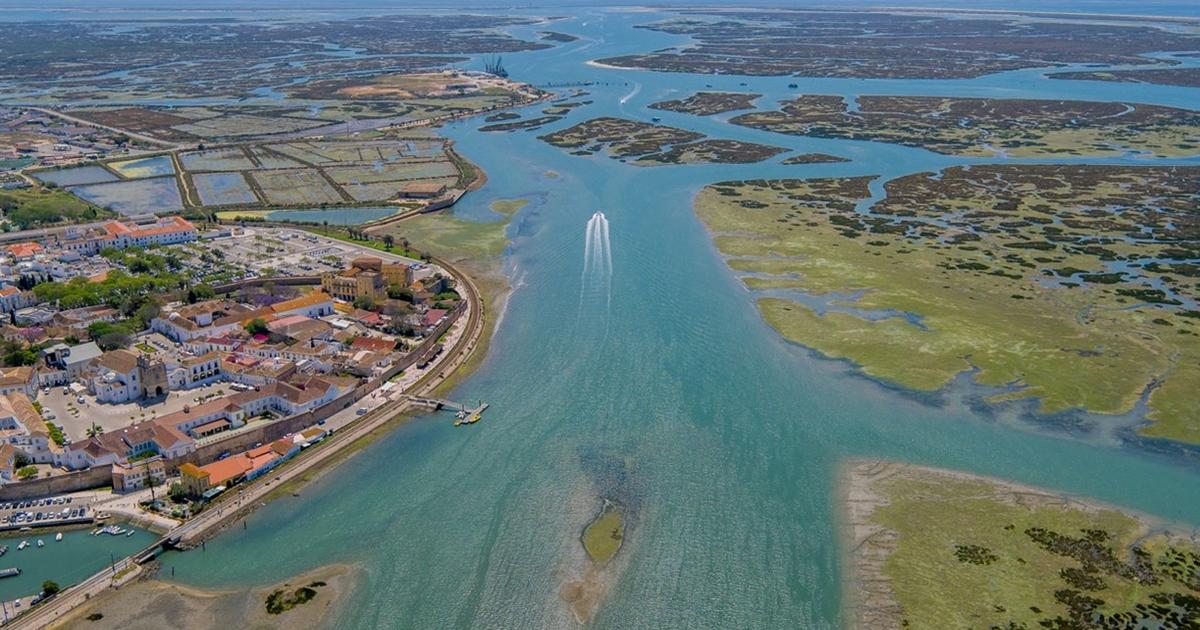Enlarge image
Popular tourist area of Alfama in Portugal's capital, Lisbon
Photo: Ega Birk / Westend61 / imago images
The yellow tram on line 28, which usually squeaks through the alleys of the old town of Lisbon, is suddenly completely empty on most Instagram pictures.
There are now more seagulls than tourists on the Praça do Comércio.
And on the windows of the otherwise mostly fully booked holiday apartments in the Alfama district, one increasingly sees a sign saying "à venda" - for sale.
The pandemic brought Portugal to a standstill, practically no one was allowed to enter the country for weeks, especially not for sightseeing and city tourism.
After record numbers of new infections, the country was on the verge of collapse.
With consistent restrictions, the government succeeded in lowering the numbers; today they are lower than in Germany.
But public life largely came to a standstill.
Enlarge image
Seagulls instead of people: the almost empty Praça do Comércio in the pandemic
Photo: SOPA Images / SOPA / LightRocket / Getty Images
There has also been a rush of backpackers in Barcelona, Amsterdam and Paris in the past decade, but probably no other metropolis has surrendered itself to tourism like the city on the Tagus. The travelers helped the Portuguese out of the crisis ten years ago, in return for which politics and locals accepted many changes. In the old town there are sometimes more holiday apartments than private households, rents have exploded within a few years, old-established shops have disappeared.
The urban geographer Luís Filipe Gonçalves Mendes has been following how living together in Lisbon has changed for two decades.
Mendes researches displacement effects on the housing market and a development that he describes as "touristification".
How does he view city life?
And what opportunities does he see in the pandemic for change?
SPIEGEL:
Mr. Mendes, you have lived in Lisbon for decades. How do you feel about your city at the moment?
Luís Filipe Gonçalves Mendes:
Very mixed.
Lisbon is currently a ghost town, especially the streets in the center are empty in the evening.
The number of cases is falling, but I often wonder how things will look here in the future.
SPIEGEL:
You mean, if the tourists return from May 16, as currently planned?
Mendes:
Yeah.
Everyone longs for normalcy, but we are still in a pandemic.
I'm afraid that if in doubt, economic interests will again become more important than protecting people.
It cannot go on like it did before Corona.
SPIEGEL:
What do the visitors have to do with the plight of the locals?
Mendes:
The mix no longer works.
I am for tourism and I am happy that so many people come to us.
But the residents, the small shops and local cultural offerings are being displaced.
The many tourists destroy what they love about Lisbon.
In districts like Alfama, around 60 percent of the apartments had already been converted into short-term accommodation before the crisis.
Rents have more than tripled within a few years, and in some cases tenfold.
We are a poor country.
The pandemic has resulted in an additional thousands losing their homes because they could no longer pay the rent.
We have to be careful that Lisbon doesn't become a Disneyland with no real life.
When there are only Airbnbs everywhere, a city no longer works.
Enlarge image
A now rare sight: an old woman is standing on the small balcony of her apartment in the old town of Lisbon (archive)
Photo: Olaf Schuelke / imago images
SPIEGEL:
Isn't that a Europe-wide phenomenon?
Mendes:
The situation in Lisbon is different because we are more dependent on tourism than almost any other capital city.
I looked at the numbers for Paris, Copenhagen, Madrid or Berlin.
In absolute numbers there are sometimes even more holidaymakers there.
In relation to the inhabitants, however, only Venice is comparable.
The situation is really bad there too.
But Venice is as big as the suburb I live in.
Lisbon, on the other hand, is a capital that has turned into a monster.
At times we had double-digit growth per year in tourism.
More than two million people live here in the region and currently there is hardly any social housing left.
Even the travel industry understands that something has to change.
SPIEGEL:
You are breaking away from "touristification" - what do you mean by that?
Mendes:
I mean three points by this: Tourism development happens very quickly, it is unregulated and then it becomes dominant.
That is exactly what happened in Lisbon.
Our city has always lived from tourism, but the years after the financial crisis have dwarfed everything.
This creates a dangerous addiction.
And for frustration.
If the extreme right in Portugal were a little smarter, they would have made people's housing shortage an issue long ago.
SPIEGEL:
Barcelona is now relying on luxury tourists from Russia in order to earn more money with fewer guests.
Would that be a solution?
Mendes:
I don't think so.
So you only make yourself dependent on the next group.
In addition, travel should be open to everyone.
Enlarge image
The world-famous yellow and white tram of Lisbon currently drives through the old town with significantly fewer guests
Photo: Gustavo Valiente / SOPA / LightRocket / Getty Images
SPIEGEL:
The city government announced last year that it would turn vacation apartments into affordable rental apartments in order to alleviate the housing shortage.
What do you think of this move?
Mendes:
That was a very clever and pragmatic concept.
The city rents the apartments for five years and pays a fixed price depending on the size.
For example, if you own a one-room apartment, you get 400 euros a month for it.
Before the crisis, you could have earned 2000 euros with it.
But the tourists are gone and the city has agreed to transfer the rent for three years at once.
The new tenants, in turn, pay a maximum of one third of their income for the apartment, with the city taking care of the rest.
This is a deal for everyone to calculate with.
SPIEGEL:
Will the program be accepted?
Mendes:
So far there have been 10,000 prospective renters, but unfortunately only 200 apartments are on offer.
This means that the owners prefer to leave their apartments empty instead of renting them out to the city.
Many fear that otherwise they will no longer be able to offer them to tourists later on.
Others rely on medium-term leases to business people and students from abroad.
Many are currently hoping that things will soon continue as they did before the pandemic.
SPIEGEL:
What are you calling for in order to defuse the crisis?
Mendes:
We have to think bigger and ask ourselves how our city should develop.
The rental period of five years is too short.
Even if the program went better, this would not be enough time to build new apartments or to solve all political problems.
But an increase in the contract duration alone will not be enough.
In this city, 22,000 holiday apartments and 3,000 residential buildings are currently uninhabited.
That they are not used in this demand is an indictment.
But there are reasons for this: The tax rate for rental income is currently 28 percent.
I'm close to the communists, but that's way too much.
SPIEGEL:
Your suggestion?
Mendes:
The state doesn't earn any money with housing anyway.
But it will be expensive if it is missing.
The government should lower the tax to five percent and stipulate that every fourth apartment in renovated and new buildings should be reserved for the needy.
Cooperative living should also be promoted.
All of this together could help tourists and locals to live together again in this city.
This contribution is part of the Global Society project
Expand areaWhat is the Global Society project?
Under the title Global Society, reporters from
Asia, Africa, Latin America and Europe
report on injustices in a globalized world, socio-political challenges and sustainable development.
The reports, analyzes, photo series, videos and podcasts appear in the international section of SPIEGEL.
The project is long-term and will be supported by the Bill & Melinda Gates Foundation (BMGF) for three years.
A detailed FAQ with questions and answers about the project can be found here.
AreaWhat does the funding look like in concrete terms?
The Bill & Melinda Gates Foundation (BMGF) is supporting the project for three years with a total of around 2.3 million euros.
Are the journalistic content independent of the foundation?
Yes.
The editorial content is created without the influence of the Gates Foundation.
Do other media have similar projects?
Yes.
Big European media like "The Guardian" and "El País" have set up similar sections on their news sites with "Global Development" and "Planeta Futuro" with the support of the Gates Foundation.
Have there already been similar projects at SPIEGEL?
In recent years, SPIEGEL has already implemented two projects with the European Journalism Center (EJC) and the support of the Bill & Melinda Gates Foundation: The "Expedition The Day After Tomorrow" on global sustainability goals and the journalistic refugee project "The New Arrivals", as part of this several award-winning multimedia reports on the topics of migration and flight have been produced.
Where can I find all publications on global society?
The pieces can be found at SPIEGEL on the topic Global Society.














